Nigeria’s Young Workforce: The Backbone of Africa’s Next Manufacturing Powerhouse
04 December, 2024
Nigeria is on track to position itself as a major industrial hub in Africa, leveraging its demographic dividend—a young and dynamic workforce that drives change in the processing and manufacturing sectors. With 70% of its population (source: punchng.com) under age 30, Nigeria's youthful demographic advantage holds vast potential for global manufacturers across various sectors.
This demographic dividend is recognised and leveraged to shape the present and future landscape of manufacturing in the region through skills acquisition initiatives, technological innovation and labour terms to mould a globally competitive workforce. It is this population strength, combined with Nigeria’s strategic location and evolving business-friendly policies, that create an ideal environment for industrial hubs like the Lagos Free Zone to emerge as drivers of development (source: ntu.edu.sg) and global investment in the country.
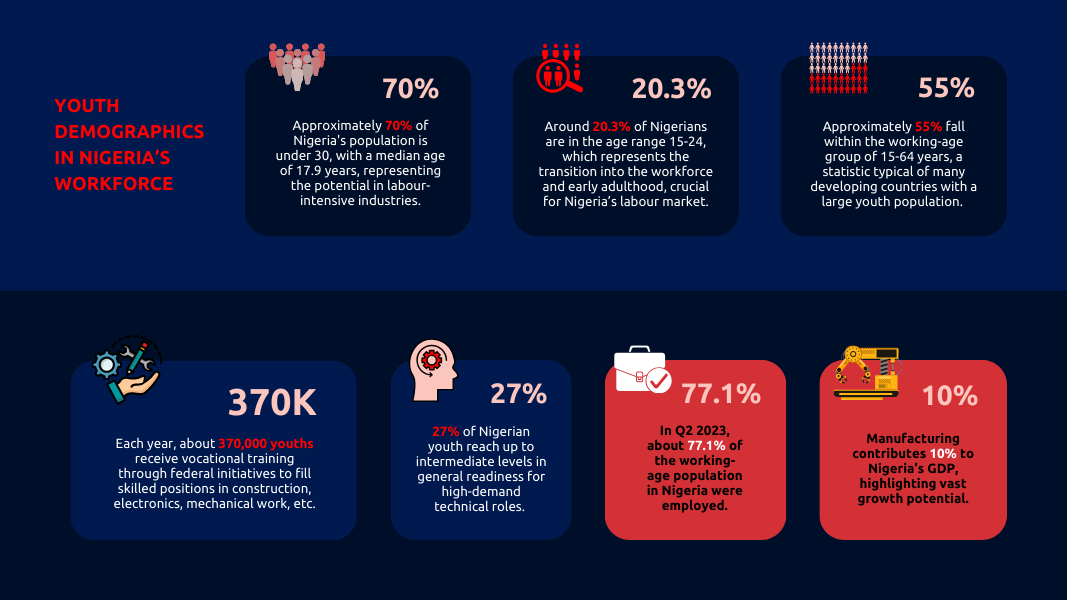
An overview of the youth demography in Nigeria
A dynamic workforce for growing industries
Nigeria’s youth population, the largest in Africa (source: businessday.ng), presents an adaptable and trainable labour pool that has become a cornerstone for the manufacturing industry. According to the World Bank’s June 2019 report (source: cgdev.org), Nigeria's working-age population is expected to exceed 120 million by 2030, creating opportunities for manufacturers seeking to leverage a large workforce ready to adapt to new technologies, processes and products.
These demographics allow for the scale necessary to support large-scale manufacturing, from automotive and electronics production to pharmaceuticals and consumer goods.It also means a steady influx of young people into the labour market increasing the competition for jobs and contributing to the prevalence ofcompetitive wages. As a result, manufacturing companies get the best of both worlds with relatively low labour costs, and access to a highly capable and trainable workforce.
A future-ready workforce
Recognising the need for skill development, the federal government and private sector have rolled out numerous initiatives to upskill Nigerian youth, especially for roles in technology and advanced manufacturing. The Industrial Training Fund (source: itf.gov.ng)’s (ITF) National Industrial Skills Development Programme (NISDP) in collaboration with the Federal Ministry of Industry Trade and Investment, is a key example, training thousands of youth (source: /thenationonlineng.net) annually in industry-relevant skills such as welding, mechatronics and electrical maintenance.
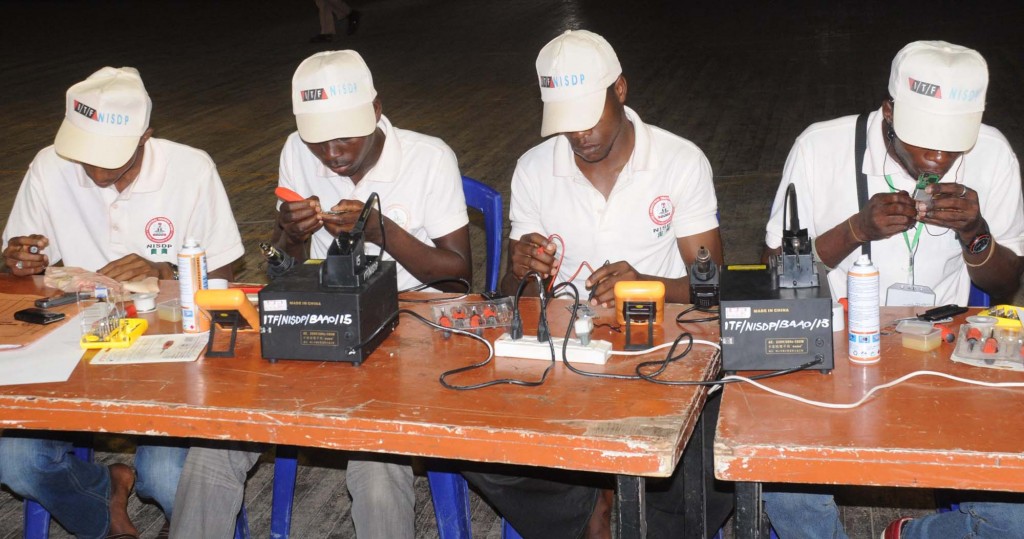
A group of NISDP trainees | Source: Industrial Training Fund
The Nigerian Economic Summit Group (source: nesgroup.org) (NESG) also collaborates with stakeholders to introduce vocational programs that provide young people with practical skills in automation, robotics and digital production tools. Partners like Cisco Networking Academy (source: netacad.com) provide essential digital skills training in networking, cybersecurity and Internet of Things (IoT) technologies for free, allowing young Nigerians to build practical skills applicable in manufacturing settings, especially with automation and digitalisation in mind. NESG has also worked with Andela and the Tony Elumelu Foundation to further the technical and entrepreneurial training of the youth. Through these partnerships, NESG connects the educational offerings of private tech institutions directly to the needs of Nigeria's growing manufacturing industries, ensuring that young people are equipped with relevant, high-demand skills.
Private companies, including manufacturers, complement these initiatives by investing in training programmes designed to familiarise young Nigerians with advanced manufacturing tools and technologies. For example, Siemens Nigeria has partnered with various educational institutions to develop technical skills training in automation and digitalisation. Nestlé Nigeria’s Technical Training Centres (TTCs) (source: thesun.ng) are also dedicated to building technical skills among the Nigerian youth. Since 2011, Nestlé has invested over ₦6 billion (source: megastarmagazine.com) ($3.6 million) to support these centres as part of their larger “Nestlé Needs YOUth” initiative. The 18-month program combines theoretical knowledge with practical experience after which participants receive certification from the City and Guilds of London.
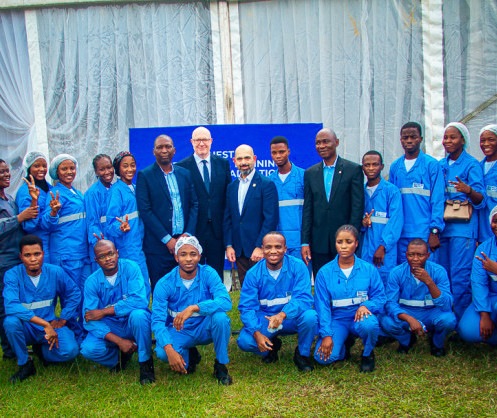
Nestlé Needs YOUth 2024 Graduates at the Flowergate Factory | Source: Vanguard (source: vanguardngr.com)
A tech-savvy generation fuelling innovation
This generation of Nigerian youth is highly educated and tech-savvy, positioning them as major assets as many industries now embrace tech for automation (source: cnbcafrica.com), IoT (Internet of Things) and sustainable production processes to increase efficiency and reduce waste.
This tech-first approach aligns with Nigeria's ongoing push toward green manufacturing practices (source: seforall.org), where sustainable energy sources and resource optimisation play a growing role. Nigeria's young entrepreneurs are also active in tech innovation, creating applications and platforms that help manufacturers streamline supply chains, track resources and automate quality control. This tech ecosystem not only supports efficient manufacturing processes but also attracts international investments with technology, sustainability and innovation goals.
Innovations by Nigerian founders such as Renda Africa (source: renda.co), Capsa Technology (source: guardian.ng), Haul247 (source: haul247.co) help to foster a reliable, transparent supply chain environment invaluable for global manufacturers seeking a stable and efficient base in Nigeria.
Labour cost competitiveness
One of Nigeria’s main draws for manufacturing is its competitive labour cost. With an hourly manufacturing labour cost significantly lower than in developed nations, Nigeria offers a financially viable alternative for companies looking to expand their manufacturing footprint. The manufacturing labour cost is estimated to be around $2 to $3 per hour (source: cgdev.org), which is significantly lower than in developed nations. For instance, the United States' average hourly manufacturing labour cost (source: theglobaleconomy.com) is around $26, and, Canada’s sits around $37, and Germany’s is about $48
Nigeria’s large young population, coupled with the low costs of labour have a compounding effect on its attractiveness for new ventures, making it an ideal long-term investment destination for scalable production.
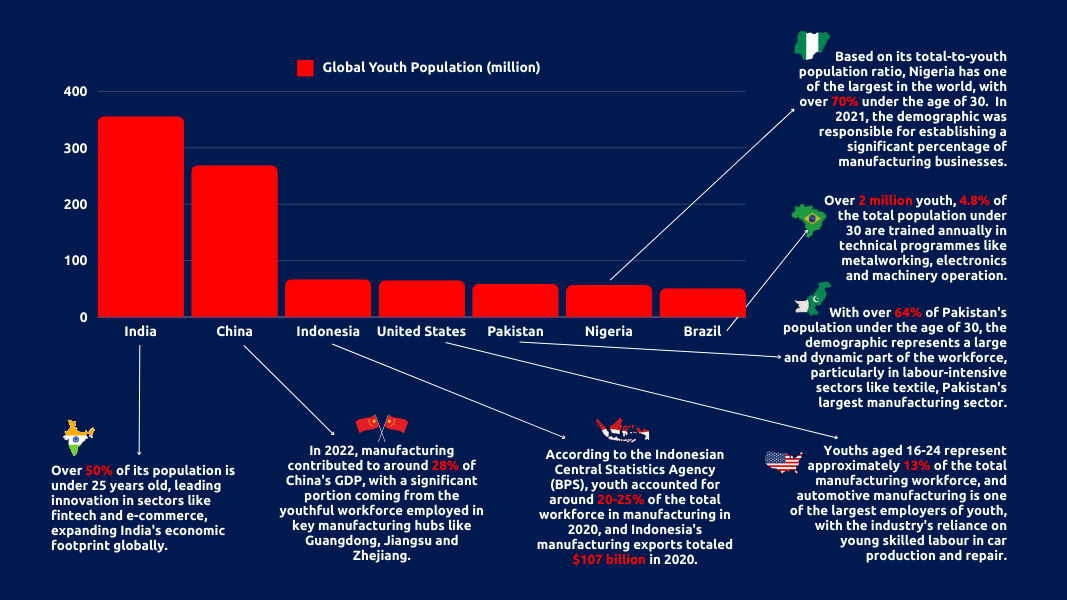
Top 7 countries with the largest population under 30 and how this demographic impacts their economies
Availability of young and skilled workforce at Nigeria’s free zones
Lagos Free Zone (LFZ), Nigeria's premier private free trade zone, exemplifies the country’s commitment to becoming a leading manufacturing hub. In addition to its strategic location, tax incentives and reduced administrative requirements, LFZ offers access to Nigeria’s sizable labour pool, making it an attractive choice for investors interested in setting up manufacturing operations.
LFZ supports Nigeria’s economic diversification goal of expanding local industries beyond petroleum products and boosting the manufacturing sector’s contribution to the GDP. The Zone’s infrastructure is specifically designed to attract foreign direct investment (FDI) and enhance the ease of doing business. Witha current employed capital of over $2.75BN, the Zone projects an annual GDP impact of over $12 billion (source: thecable.ng) by 2032.
LFZ also aligns with sustainability goals through projects like its 20-year Gas Infrastructure Development Agreement, set to connect the Zone with Nigeria’s national gas grid. This integration promotes the use of natural gas, reducing reliance on other non-renewable resources while lowering the cost of energy for companies.
The Zone also features an Industrial Training Skills Center, where youth from the surrounding host communities can enrol and gain knowledge of valuable, in-demand skills such as masonry, plumbing, carpentry, and electrical works, without any financial burden. These skill acquisition programs are conducted by certified trainers and last for a period of six months, including a 3-month paid internship. Through this alignment, LFZ not only supports industrialisation but also provides young Nigerians with direct employment opportunities and technical training, shaping a competent workforce for long-term growth.
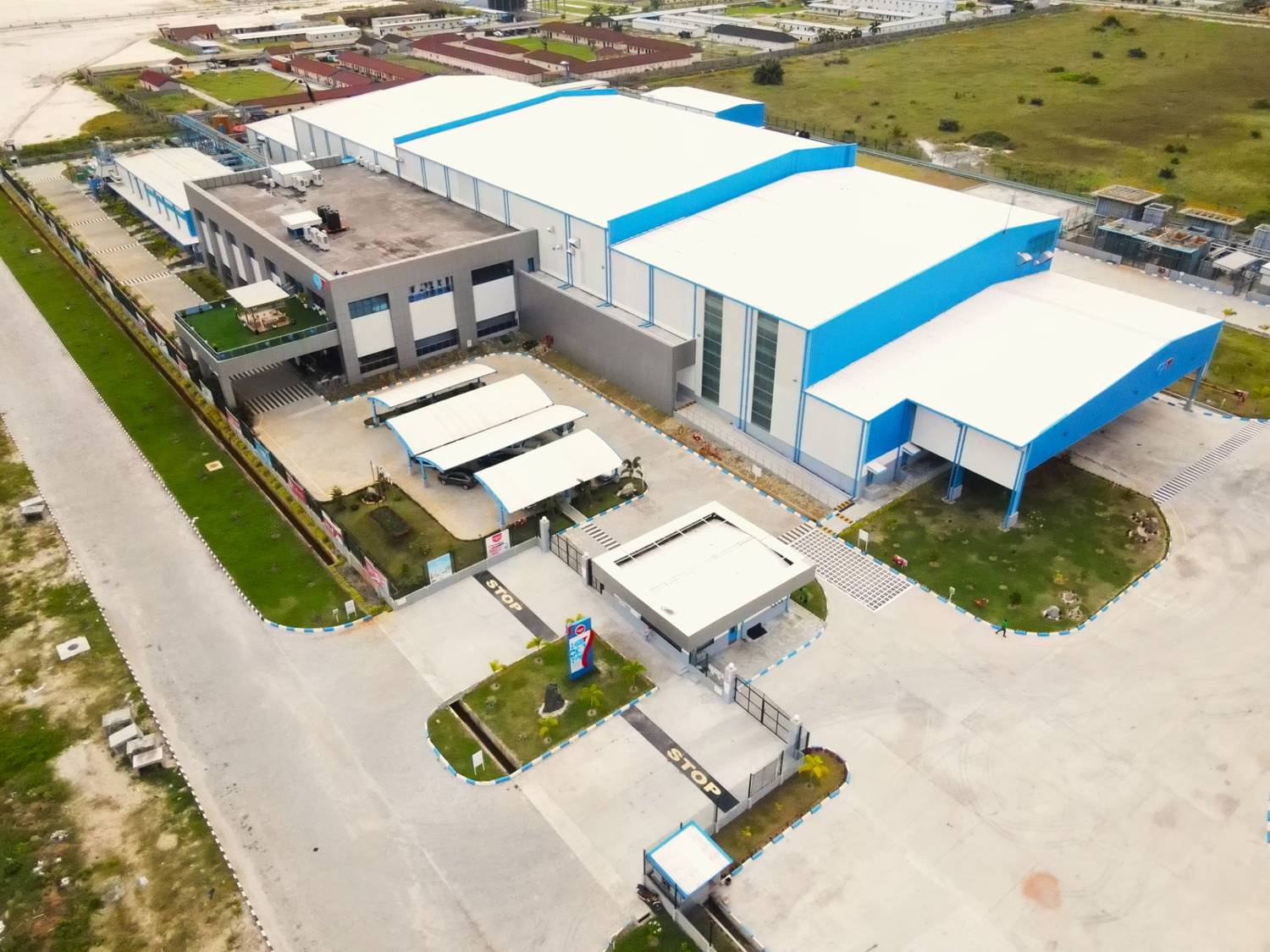
Colgate-Palmolive Plant in the Lagos Free Zone | Source: Lagos Free Zone
In conclusion
Nigeria offers more than just a labour market; it is a strategic gateway to Africa, backed by a workforce that is adaptable, tech-savvy and competitively priced. Nigeria’s young workforce is a powerful asset for the future of the manufacturing sector. With government and private initiatives in place to further upskill this force, Nigeria offers a sustainable and competitive option for manufacturers seeking scalable, cost-effective operations.
Investing in Nigeria’s manufacturing sector offers access to a dynamic market with significant long-term growth potential, positioning companies to play a key role in shaping the future of African industrialisation. By taking advantage of the world-class infrastructure and incentives offered at Lagos Free Zone, investors can harness Nigeria’s demographic dividend, confident that the country’s young workforce is poised to drive Africa’s next industrial revolution.


